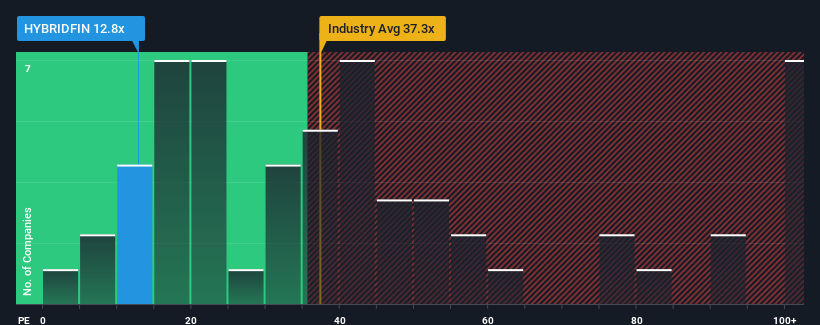- India
- /
- Professional Services
- /
- NSEI:HYBRIDFIN
Further Upside For Hybrid Financial Services Limited (NSE:HYBRIDFIN) Shares Could Introduce Price Risks After 28% Bounce

Hybrid Financial Services Limited (NSE:HYBRIDFIN) shares have had a really impressive month, gaining 28% after a shaky period beforehand. Looking back a bit further, it's encouraging to see the stock is up 97% in the last year.
In spite of the firm bounce in price, Hybrid Financial Services' price-to-earnings (or "P/E") ratio of 12.8x might still make it look like a strong buy right now compared to the market in India, where around half of the companies have P/E ratios above 33x and even P/E's above 63x are quite common. Nonetheless, we'd need to dig a little deeper to determine if there is a rational basis for the highly reduced P/E.
With earnings growth that's exceedingly strong of late, Hybrid Financial Services has been doing very well. One possibility is that the P/E is low because investors think this strong earnings growth might actually underperform the broader market in the near future. If you like the company, you'd be hoping this isn't the case so that you could potentially pick up some stock while it's out of favour.
See our latest analysis for Hybrid Financial Services

How Is Hybrid Financial Services' Growth Trending?
Hybrid Financial Services' P/E ratio would be typical for a company that's expected to deliver very poor growth or even falling earnings, and importantly, perform much worse than the market.
Retrospectively, the last year delivered an exceptional 432% gain to the company's bottom line. Pleasingly, EPS has also lifted 217% in aggregate from three years ago, thanks to the last 12 months of growth. So we can start by confirming that the company has done a great job of growing earnings over that time.
Weighing that recent medium-term earnings trajectory against the broader market's one-year forecast for expansion of 26% shows it's noticeably more attractive on an annualised basis.
In light of this, it's peculiar that Hybrid Financial Services' P/E sits below the majority of other companies. Apparently some shareholders believe the recent performance has exceeded its limits and have been accepting significantly lower selling prices.
The Key Takeaway
Even after such a strong price move, Hybrid Financial Services' P/E still trails the rest of the market significantly. We'd say the price-to-earnings ratio's power isn't primarily as a valuation instrument but rather to gauge current investor sentiment and future expectations.
Our examination of Hybrid Financial Services revealed its three-year earnings trends aren't contributing to its P/E anywhere near as much as we would have predicted, given they look better than current market expectations. When we see strong earnings with faster-than-market growth, we assume potential risks are what might be placing significant pressure on the P/E ratio. It appears many are indeed anticipating earnings instability, because the persistence of these recent medium-term conditions would normally provide a boost to the share price.
You should always think about risks. Case in point, we've spotted 2 warning signs for Hybrid Financial Services you should be aware of.
If these risks are making you reconsider your opinion on Hybrid Financial Services, explore our interactive list of high quality stocks to get an idea of what else is out there.
Valuation is complex, but we're here to simplify it.
Discover if Hybrid Financial Services might be undervalued or overvalued with our detailed analysis, featuring fair value estimates, potential risks, dividends, insider trades, and its financial condition.
Access Free AnalysisHave feedback on this article? Concerned about the content? Get in touch with us directly. Alternatively, email editorial-team (at) simplywallst.com.
This article by Simply Wall St is general in nature. We provide commentary based on historical data and analyst forecasts only using an unbiased methodology and our articles are not intended to be financial advice. It does not constitute a recommendation to buy or sell any stock, and does not take account of your objectives, or your financial situation. We aim to bring you long-term focused analysis driven by fundamental data. Note that our analysis may not factor in the latest price-sensitive company announcements or qualitative material. Simply Wall St has no position in any stocks mentioned.
About NSEI:HYBRIDFIN
Hybrid Financial Services
Provides management consultancy services primarily in India.
Solid track record with excellent balance sheet.
Market Insights
Community Narratives



